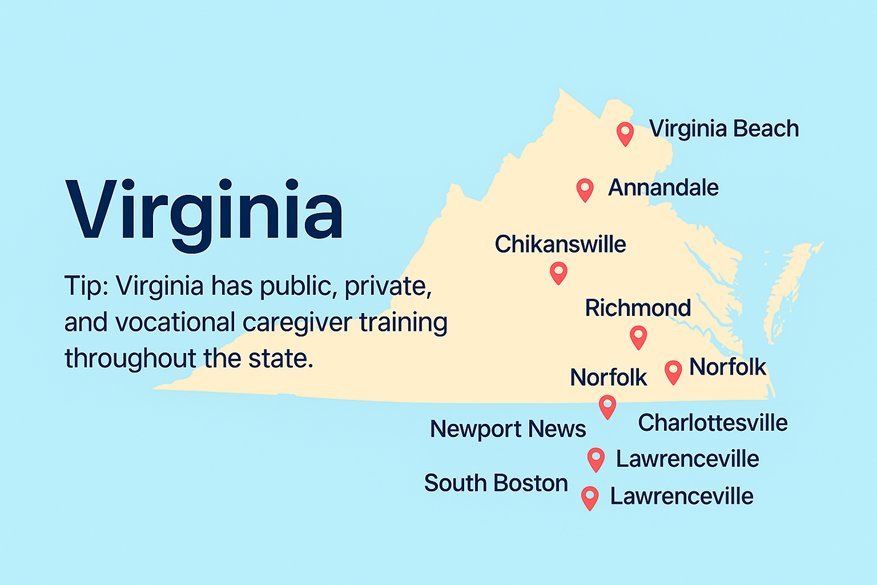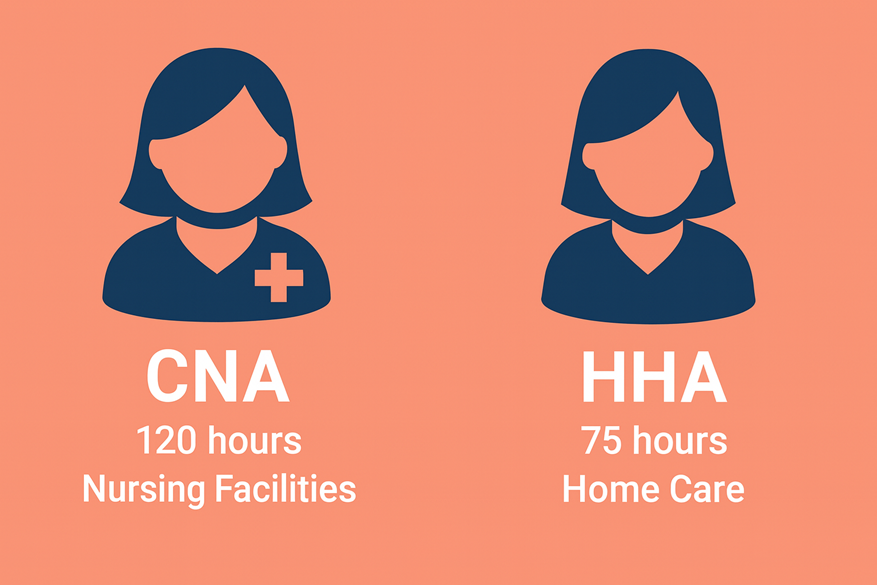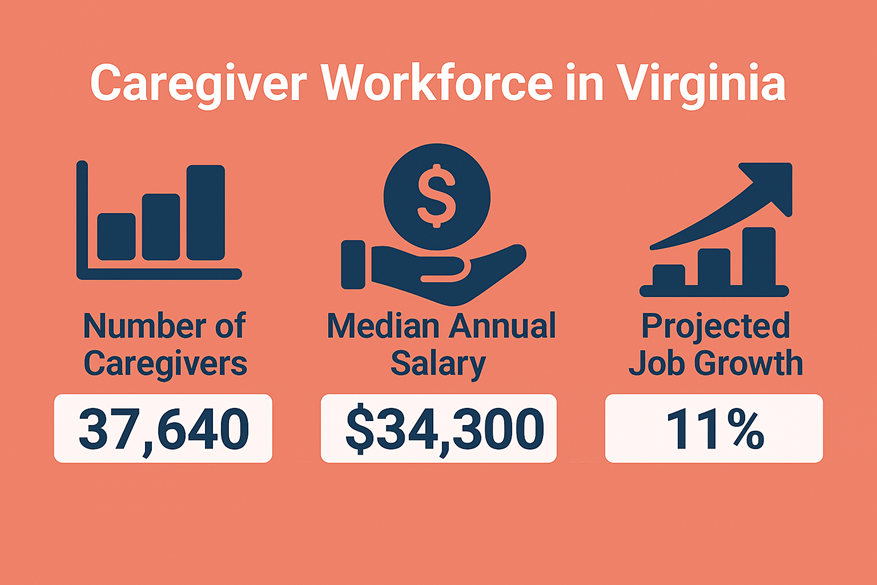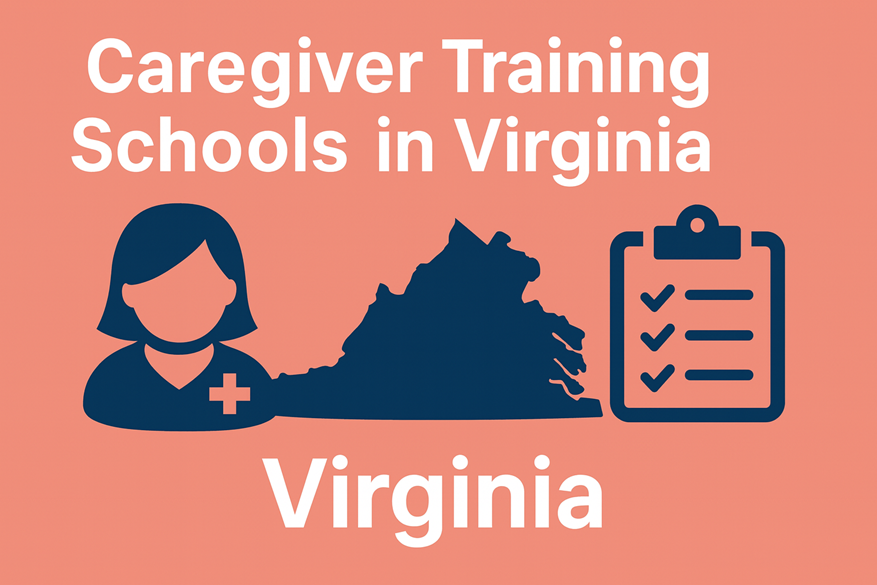If you’re thinking about becoming a caregiver in Virginia, you’re in good company. With a growing aging population, the demand for trained and compassionate caregivers is higher than ever. Whether you’re aiming to become a Certified Nursing Assistant (CNA) or a Home Health Aide (HHA), Virginia offers plenty of training opportunities to help you get started. This guide will walk you through the different paths, schools, job outlook, certification steps, and everything else you need to know to begin your journey in caregiving.
Training Paths for Caregivers in Virginia

In Virginia, there are two main training paths for entry-level caregiving careers: CNA (Certified Nursing Assistant) and HHA (Home Health Aide). Both roles are vital in supporting seniors and individuals with disabilities, but they follow slightly different certification processes and training standards.
You can find caregiver training through:
- Public or private colleges and community colleges
- Vocational and career schools
- Local health training centers and private programs
Let’s break it down by type.
Public & Private Colleges in Virginia
Several community colleges and private institutions across Virginia offer state-approved CNA and HHA training programs. These programs are ideal if you’re looking for structured training backed by a well-established institution. Many schools also offer financial aid or flexible schedules for adult learners.
Vocational & Career Schools in Virginia
Vocational and career-focused schools tend to offer shorter, more intensive programs for students who want to jump into the workforce quickly. These programs are often located in urban and suburban areas and may be more affordable and flexible than college-based programs.
CNA vs HHA in Virginia: What’s the Difference?

In Virginia, CNAs and HHAs share many caregiving responsibilities, but their training and work environments differ slightly.
Certified Nursing Assistant (CNA)
- Training Requirement: At least 120 hours (including 40 clinical hours)
- Certification: Must pass the Virginia CNA exam and register with the Virginia Nurse Aide Registry
- Work Settings: Nursing homes, hospitals, assisted living, rehabilitation centers
- Supervision: Typically works under registered nurses (RNs) or licensed practical nurses (LPNs)
Home Health Aide (HHA)
- Training Requirement: Usually 75–100 hours (varies by provider)
- Certification: Some HHAs are certified through employer-sponsored programs. If working for Medicare/Medicaid-approved agencies, HHAs must meet federal standards
- Work Settings: Client’s private homes, home care agencies
- Supervision: Usually under a registered nurse’s supervision from the agency
In short, CNAs receive more formal, state-regulated training and can work in a broader range of facilities. HHAs typically focus on home care and may have a lighter training load, depending on the employer.
What About PCA Training in Virginia?
If you’re looking to enter caregiving without becoming a CNA or HHA just yet, PCA (Personal Care Aide) training is a great starting point. In Virginia, PCAs provide basic non-medical assistance like helping with bathing, dressing, meals, light housekeeping, and companionship—usually in a client’s home.
Here are a few key things to know about becoming a PCA in Virginia:
- No formal license is required by the state for PCAs, but most employers—especially Medicaid-participating home care agencies—will require you to complete a state-approved PCA training program.
- Training typically takes 40 to 60 hours and can be completed in as little as 1 week at some schools or agencies.
- Virginia’s Department of Medical Assistance Services (DMAS) requires all PCAs working under Medicaid-funded programs (like CCC Plus Waivers) to complete approved training and pass a competency evaluation.
- Many caregiver schools and home care agencies across Virginia offer PCA courses—these are usually more affordable and faster than CNA training.
- PCA roles are often a stepping stone toward CNA or HHA certification if you decide to level up your career later on.
Work settings for PCAs include:
- Private homes (most common)
- Companion care agencies
- Non-medical home care programs
- Medicaid waiver programs through local Area Agencies on Aging
Being a PCA is a great way to gain experience and decide if you want to continue toward CNA or nursing training later on. It’s ideal for people who want to start helping others quickly with minimal cost and commitment upfront.
Job Market Outlook in Virginia (as of August 2025)

If you’re wondering whether caregiving is a stable career in Virginia, the answer is yes. In fact, it’s one of the fastest-growing healthcare roles in the state.
According to the most recent data:
- Certified Nursing Assistants (CNAs) in Virginia earn an average salary of $34,500 to $41,000 per year, depending on location and experience.
- Home Health Aides (HHAs) typically earn $30,000 to $37,000 per year.
High-demand regions include Northern Virginia, Richmond, Virginia Beach, and Roanoke, where there are larger senior populations and more healthcare employers. The state projects thousands of job openings in caregiving roles each year due to aging baby boomers and high turnover in entry-level healthcare positions.
Flexible hours, consistent demand, and the potential to move into advanced nursing or therapy careers make this field attractive for new workers and career changers alike.
Licensing & Certification Steps in Virginia
For CNAs:
- Complete a Virginia Board of Nursing-approved training program
- Pass the NNAAP (National Nurse Aide Assessment Program) exam, which includes both written and skills tests
- Get listed on the Virginia Nurse Aide Registry
- Maintain your license by working a minimum of 8 hours every 24 months in a paid CNA role
For HHAs:
- Complete a training program that meets federal and state home care requirements
- If working with Medicare/Medicaid-approved agencies, you must complete at least 75 training hours and a competency evaluation
- Keep records of training and renewal with the agency or employer as required
Unlike CNAs, HHAs in Virginia are not registered through a centralized state registry, unless they are dual-certified as CNAs. However, many agencies still require background checks and updated training.
Recap: Start Your Caregiver Journey in Virginia
Choosing to become a caregiver is more than just a job—it’s a way to make a difference in someone’s life. Whether you’re aiming to become a CNA in a hospital or a home health aide supporting someone in their daily routine, there are dozens of schools in Virginia ready to help you get started.
Explore your local options, compare programs, and don’t be afraid to call schools directly to ask questions. Training can often be completed in under three months, and with job openings all across the state, you could be working in the field before the year ends.
Disclaimer
The information in this guide reflects current research as of August 2025. Requirements, program lengths, costs, and certification processes may change. Always verify details with the Virginia Board of Nursing, approved training providers, or official employer guidelines before enrolling in a program.
Sources
- Virginia Board of Nursing: https://www.dhp.virginia.gov/Boards/Nursing
- Virginia Nurse Aide Registry: https://www.dhp.virginia.gov
- U.S. Bureau of Labor Statistics (BLS) – Nursing Assistants: https://www.bls.gov/ooh/healthcare/nursing-assistants.htm
- Virginia Employment Commission: https://www.vec.virginia.gov
- Training provider websites listed in tables above

